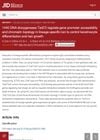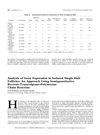 41 citations,
January 2020 in “BioMed Research International”
41 citations,
January 2020 in “BioMed Research International” Micrografts improve hair density and thickness without side effects.
 January 2018 in “Stem cell biology and regenerative medicine”
January 2018 in “Stem cell biology and regenerative medicine” The nucleus is key in controlling skin growth and repair by coordinating signals, gene regulators, and epigenetic changes.

Nanocarriers with plant extracts show promise for safe and effective hair growth treatment.
 11 citations,
September 2020 in “Journal of Cosmetic Dermatology”
11 citations,
September 2020 in “Journal of Cosmetic Dermatology” Silver nanoparticles can significantly promote hair growth.
6 citations,
November 2022 in “Antioxidants” OR2AT4 helps reduce aging and cell damage in human skin cells.
 108 citations,
September 2002 in “The Journal of clinical investigation/The journal of clinical investigation”
108 citations,
September 2002 in “The Journal of clinical investigation/The journal of clinical investigation” Lowering testosterone speeds up wound healing in male mice.
106 citations,
February 2014 in “eLife” Lanceolate complexes in mouse hair follicles are essential for touch and depend on specific cells for maintenance and regeneration.
 May 2023 in “Clinical, Cosmetic and Investigational Dermatology”
May 2023 in “Clinical, Cosmetic and Investigational Dermatology” The research found proteins in human skin cells that help with wound healing and hair growth, which could lead to new treatments.
 3 citations,
September 2022 in “Molecules”
3 citations,
September 2022 in “Molecules” Camellia seed cake extract may help hair growth by blocking the hair loss effects of a hormone called DHT.
 July 2023 in “Frontiers in veterinary science”
July 2023 in “Frontiers in veterinary science” Certain long non-coding RNAs are important for controlling hair growth cycles in sheep.
 April 2023 in “The journal of investigative dermatology/Journal of investigative dermatology”
April 2023 in “The journal of investigative dermatology/Journal of investigative dermatology” Tet2 and Tet3 enzymes are important for controlling hair growth and shape by affecting gene activity and DNA structure in hair follicles.
 39 citations,
August 2016 in “Journal of Dermatological Treatment”
39 citations,
August 2016 in “Journal of Dermatological Treatment” Stem cell therapy may help treat tough hair loss cases.
 30 citations,
October 2016 in “Current research in translational medicine”
30 citations,
October 2016 in “Current research in translational medicine” Hair follicles on the scalp interact with and respond to the nervous system, influencing their own behavior and growth.
 38 citations,
January 2019 in “International Journal of Women's Dermatology”
38 citations,
January 2019 in “International Journal of Women's Dermatology” The document concluded that more research is needed to find the best treatment for Frontal fibrosing alopecia.
2 citations,
August 2022 in “Frontiers in Immunology” Microneedling with betamethasone led to almost complete hair regrowth in severe alopecia areata.
March 2023 in “Clinical, Cosmetic and Investigational Dermatology” Spironolactone can effectively treat hair loss with manageable side effects.
February 2025 in “International Journal of Molecular Sciences” Maternal melatonin improves offspring hair growth by affecting specific proteins and pathways.
 February 2024 in “Plastic and Reconstructive Surgery – Global Open”
February 2024 in “Plastic and Reconstructive Surgery – Global Open” Stem cell therapies show promise for hair regrowth in androgenetic alopecia.
 1 citations,
February 1993 in “Nursing Standard”
1 citations,
February 1993 in “Nursing Standard” Many drugs, not just chemotherapy, can cause reversible hair loss.
51 citations,
December 2017 in “Skin Appendage Disorders” Stress may trigger hair loss by affecting immune protection in hair follicles.
 25 citations,
October 2019 in “JAAD Case Reports”
25 citations,
October 2019 in “JAAD Case Reports” Baricitinib helped a woman with severe hair loss regrow almost all her hair without side effects.
 2 citations,
January 2023 in “International Journal of Biological Sciences”
2 citations,
January 2023 in “International Journal of Biological Sciences” A specific pathway involving AR, miR-221, and IGF-1 plays a key role in causing common hair loss.
 May 1995 in “Journal of Investigative Dermatology”
May 1995 in “Journal of Investigative Dermatology” Researchers developed a new way to measure gene activity in single hair follicles and found that a specific gene's activity changes with different amounts and times of treatment.
 May 2024 in “Chemical engineering journal”
May 2024 in “Chemical engineering journal” New treatment using Minoxidil and EGCG with ionic liquids improves hair growth and quality for hair loss.
 16 citations,
October 2014 in “Cell death and disease”
16 citations,
October 2014 in “Cell death and disease” FoxN1 overexpression in young mice harms immune cell and skin development.
39 citations,
November 2007 in “Experimental dermatology” Human hair follicles contain a complex network of prostanoid receptors that may influence hair growth.
 2 citations,
August 2023 in “Marine drugs”
2 citations,
August 2023 in “Marine drugs” Collagen from tilapia scales may improve hair and skin health by reducing stress and inflammation and encouraging hair growth.
 6 citations,
November 2010 in “Histochemistry and cell biology”
6 citations,
November 2010 in “Histochemistry and cell biology” The proteins transthyretin and megalin are more present in the growth phase of hair, suggesting they might affect hair health and growth.
 June 2023 in “Current Issues in Molecular Biology”
June 2023 in “Current Issues in Molecular Biology” DN106212, an extract from a plant, is better at promoting hair growth than other tested substances by affecting hair growth factors and follicle development.

Chrysanthemum zawadskii extract may help treat hair loss by promoting hair growth and affecting growth factors.























